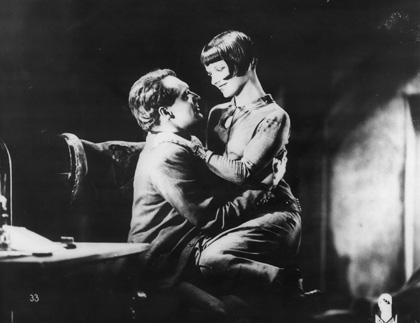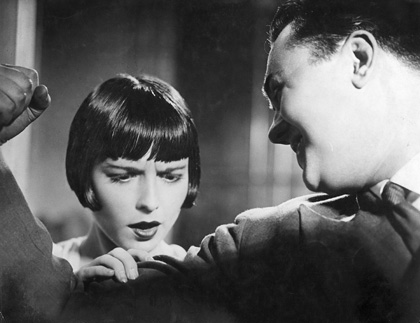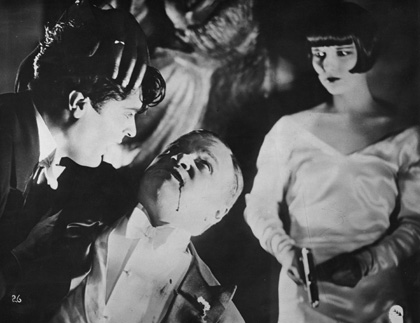Festivals
London Film Festival 2010: The S&S blog
Pandora’s Box, restored

James Bell, 15 October
To the BFI Southbank last night for the first screening in this year’s archive selection: a new digital restoration of GW Pabst’s silent 1929 masterpiece Pandora’s Box, boasting, of course, Louise Brooks’ stupendous, iconic performance as Lulu, who is “practised in the art of flattery” and beguiles everyone she meets (even attorneys prosecuting her), yet comes to a tragic end. As the festival’s Treasures from the Archives strand’s programmer Clyde Jeavons reminded us in his opening remarks, the film wasn’t a success on its first release in Berlin in 1929, and it was only after it was revived by the likes of Henri Langlois in the 1950s that it secured its reputation as one of the most intoxicating and erotic of all silent films, and prompted Brooks herself out of obscure retirement to write Lulu in Hollywood, her great memoir of the silent years.
The many years of neglect had taken their toll on the film: no negative or original print survived, only inferior dupes ridden with scratches and other damage, out-of-focus sections, and missing intertitles that made many passages of the film confusing to follow. The new restoration was overseen by the Deutsche Kinemathek’s Martin Koerber, and was a great advertisement for what can be achieved through new digital techniques. It’s been said many times before that watching Brooks is like seeing a woman of today step into a bygone world, so modern is her poise and charisma, and that impression is only more enhanced by the pristine new picture. Her performance anticipates so much of the cinema acting that would follow; it is still astonishing how naturalistic she is, while at the same time unreachably star-like.
The film was accompanied brilliantly on the piano by Neil Brand, and I caught him afterwards – looking rather exhausted after an unbroken performance over the film’s 143 minute running time – for a few words:
“It was the second film I ever accompanied when I started out – so over the past 28 years I assume I’ve now played it 25 or 30 times. Initially what really hit me was Louise Brooks, and I think I just tried to play her. The little sparkly theme that I use, which is trying to be the sound of the kind of effect she has on people, I wrote for the very first performance I did. It sometimes gets a laugh, because as she lights up for the next man who comes into view the audience thinks, “Ah, she’s already got him!”

“Over the years two things have struck me above all about the film: one, that it really does bear this amount of attention – I have yet to get bored with it – and I’m sure that’s because it’s made with such an innate attention to detail, and a wonderfully complex view of morality. I know there are people who don’t buy this, but it’s trying to have it both ways: it’s saying that she is Pandora, she does have the power to seduce men and break them, but she is also herself a victim. At no time is any judgement made on her or on any of the other people in the film. It’s an entirely unjudgemental film, extraordinarily emotionally mature.
“Each time I play it new insights crack open. Tonight, just like everyone, I was firstly so amazed by how beautiful it was, and then I noticed that the first character we meet – the concierge, one assumes, for Lulu’s flat – never reappears after he’s introduced her. I spent the next two minutes wondering, “Why did Pabst choose to introduce Lulu with a character we’re never going to see again?” And it’s because he needs to lead us in with a character who is ‘us’ – a character completely enamoured but also slightly bemused by her behaviour – because otherwise we’d be asked right from the start to accept something that we might not want to accept. I think that’s just beautifully clever.
“There are so many such moments; I don’t remember the horrible sequence in which they get the lesbian Countess Geschwitz to seduce the fat strongman ever being so well delineated. Another thing that’s grown on me over the years, and therefore where the music has changed, is how entirely honourable a character Geschwitz is. I just feel utterly sorry for her; she’s completely manipulated by Lulu. If Lulu is guilty of nothing else, it’s of the destruction of a woman who does nothing but love and support her throughout the film. That comes across incredibly clearly now.

“When I first started playing this film I always thought the jumps across its storyline, and the slight sense of drifting from one character to the next, were slightly awkward, and the music had to try and compensate. With the new print and intertitles, which divide it into six acts, all those rough edges are smoothed out and the story is framed so much better.
“I totally respond to the film in the moment. I do come with two or three themes that I know will work, including the sparkly one. For the Christmas scene, which is magical and comes up fresh each time, I’ve always used that combination of ‘The Coventry Carol’ and ‘God Rest Ye Merry Gentlemen’ as an ironic take on Christmas. Christmas is slightly Dickensian in the film: she’s literally freezing in a garret while people are eating Christmas pudding around her. I’ve always found people really respond to tunes they know around that scene.”
The restoration is projected at 19 frames per second, slightly slower than the film used to be shown. How does that change how you approach it musically?
“I have to say I find 19 fps slightly too slow for my own taste. Some moments are spot on, but some feel slightly elongated. Twenty would be my preferred speed for the whole thing; but it does give me the chance to open the music out, and I get longer to complete my themes and fill things in with experimental stuff. I still experiment each time I play it, because I’m still trying to find that mythical, perfect score, and it ain’t there yet! I never will find it, of course, but the beauty is that each time there may be just one scene that I hit right on the nose in that performance, and I pride myself on that.”
« Opening night: Never Let Me Go
See also
London Film Festival 2010: 30 recommendations (online, October 2010)
In the magic hour: 3 silent classics by Josef von Sternberg reviewed by Michael Atkinson (October 2010)
‘Underground’, overground: Nick Bradshaw and James Bell on two archive showcases of London transport in the 2009 London Film Festival (online, October 2009)
Innocence reviewed by Jonathan Romney (November 2004)
